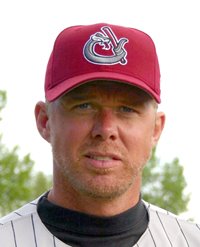Mike Busch
 When Michael Anthony Busch was called up to the big leagues on August 29, 1995, his new Los Angeles Dodger teammates did not give him a warm welcome.
When Michael Anthony Busch was called up to the big leagues on August 29, 1995, his new Los Angeles Dodger teammates did not give him a warm welcome.Yet, although they probably wanted to elbow him in the ribs, punch him in the nose, or give him a swift kick in the pants, they simply gave him the cold shoulder.
A wise decision, considering that the 27-year old Busch was a hulking, powerful 6-foot-5, 249 pound man, and likely could have taken anyone on the team who was foolish enough to challenge him to a fight.
The reaction of the Dodger players was not unexpected. In fact, it was quite predictable.
You see, a few months earlier, near the end of baseball's last labor war, Busch crossed the proverbial picket line and played in spring training games as a replacement player.
In the eyes of the other Dodger players, Busch had committed the ultimate act of treason. They viewed him as a backstabbing traitor. To them, he was Benedict Arnold in a baseball jersey.
And, incredibly, a Dodger clubhouse previously renowned for its bickering and divisiveness was now uniformly united: They did not want Busch to be part of their team.
The Dodger players went to Fred Claire, the club's General Manager and the man responsible for promoting Busch to the big leagues. They asked Claire to give Busch a one-way ticket back to Albuquerque, the club's Triple-A affiliate.
Claire refused.
Undeterred, they tried to make Busch's stay with the big club as unenjoyable and uncomfortable as possible.
They treated Busch as if he was an outcast, a pariah. They kicked him out of the clubhouse. They refused to take infield practice or batting practice with him. They did not sit next to him in the dugout during the game.
It was 24 Dodger players against Busch.
Brett Butler, the Dodgers' player representaive, criticized Busch to the media. He called Busch a scab. He said Busch did not deserve a spot on the club's roster.
Overwhelmingly, the fans sided with Busch. On August 30, 1995, the Dodger crowd cheered wildly for Busch (even louder after he struck out on three pitches during his first big league bat) and booed Butler mercilessly.
It was now some 40,000 or so fans against Butler.
The next day, Butler called an impromptu press conference with Busch in attendance and said that he and his teammates would pull for Busch as long as he wore a Dodger uniform.
Bygones would be bygones.
Well, sort of.
Busch went on to have several key hits during the playoff run in 1995, including a pennant-clinching home run off San Diego Padres' right-hander Brian Williams during the seventh inning on October 1, 1995.
His reward? He was excluded from the club's post-season roster. No matter. The Cincinnati Reds swept the Dodgers 3-0 in the playoffs.
A native of Davenport, Iowa, Busch played in the big leagues with the Dodgers in 1995 and 1996. In limited action, he belted seven home runs, but struck out 40 times in 100 career at bats.
--------------------
[1] Nightengale, Bob. "Wallach's Injury May Be Trouble in a lot of Ways." LAT, August 29, 1995, C1.
[2] Downey, Mike. "Let's Forget About Beating Down Busch." LAT, August 30, 1995, C1.
[3] Nightengale, Bob. "Dodger Call-Up Angers Players." LAT, August 30, 1995, C1.
[4] Nightengale, Bob. "Busch's Homer Caps Season." LAT, October 2, 1995, C9.
[5] Delsohn, Steve. "True Blue." New Yorker: HarperCollins Publishers, 2001.

2 Comments:
I went to high school with his guy, incredible athlete but a complete asshole and bully to everyone who was smaller than him….which happened to be the whole high school of North Scott!
Tell me more
Post a Comment
<< Home